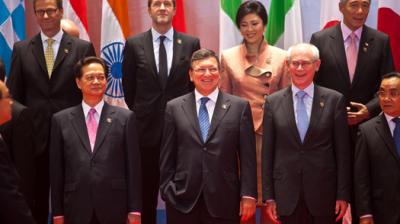EU should tango with Taiwanese tiger and Chinese dragon
Europe is losing out both economically and politically by letting China dictate its trade diplomacy towards Taiwan. This goes first and foremost for discussion about an economic agreement, which China has tried to politicise. And Brussels is letting it. Discussion about a trade or investment agreement with Taiwan has become an overly sensitive issue. Policymakers in Brussels – and in many EU capitals, for that matter – are excessively worried that any move in this direction will upset the EU’s political and economic relations with China.
Clearly, nobody should be naïve about Beijing’s willingness to flex its economic muscle for political purposes. This is especially so where it concerns adherence to the "One-China policy", which means recognising the government of the People’s Republic of China as the sole legal government of China, and therefore not maintaining diplomatic or formal political relations with Taiwan. But there is reason not to be too worried about China’s response to the opening of trade talks with Taiwan, especially if the EU is clear and consistent about its policies and the reasoning behind it.
WTO precedent
The admission in 2001 of China and Taiwan into the WTO set a good precedent for negotiating with China and Taiwan at the same time. Out of consideration to Beijing, Taiwan’s admission was approved less than a day after China was admitted – even if agreement with Taiwan had been reached much earlier. If that should not make the EU sufficiently comfortable, consider also the fact that Taiwan in recent years successfully negotiated economic agreements with a range of countries – including with ones that do not diplomatically recognise it, such as Japan, New Zealand and Singapore. Negotiations with the US have also been underway.
Since Brussels is already negotiating a bilateral investment agreement with Beijing, the door is open to initiate similar talks with Taipei. Talks on sectoral agreements could follow, even if the above also suggests that talks on a full-fledged trade agreement with Taiwan should wait until these have been initiated with China. By the standards that the EU has set for itself, Taiwan – Asia-Pacific’s fourth most competitive economy and the EU’s seventh largest trade partner in Asia – should be high up on Brussels’ wish-list. This is all the more so, since the EU inked its first free trade agreement in Asia with South Korea back in 2011, and is already negotiating economic deals with Japan, India, Malaysia, Vietnam and of course China.
Economic and geo-strategic benefits
Closer economic relations between the EU and Taiwan create mutual benefits at both the bilateral and the regional levels, as a 2012-report by the European Chamber of Commerce Taipei (ECCT) concluded. Existing levels of trade and investment between the EU and Taiwan would be elevated, delivering growth and jobs. Also, European consumers stand to gain from enhanced competition between Taiwan and especially South Korea in the EU, as products from the two countries possess a high degree of substitutability. At the regional level, Taiwan is perhaps the best gateway and springboard to China for EU businesses. The ECCT-report describes the Taiwanese as “the foreigners who understand the Chinese best”, and “the Chinese who understand the foreigners best.” This is complementary to Taiwan’s established credential as the “king maker” in ICT and other sectors.
But the potential gain of negotiating an economic agreement with Taiwan extends beyond the economic field. Clever use of the “Taiwan-card” could also benefit the EU in its talks with China. The United States knows all too well how to play this game, as it is using the Trans-Pacific Partnership talks – which exclude China, for now – as a way to lure China into reforms. Washington makes good use of Beijing’s fear of exclusion from this deal, which aspires to set tomorrow’s global standards in important fields, including investment, intellectual property rights, government procurement and state-owned enterprises.
Window of opportunity
The staggering defeat of the ruling Kuomintang Party in Taiwan’s recent local elections suggest that the window of opportunity to initiate negotiations on a EU-Taiwan investment agreement may be narrowing. Here also, the EU stands to gain strategically if it acts now. After all, Taipei is more likely to seriously address calls for regulatory reform, as long desired by European businesses. Admittedly, the limited capacity of EU negotiators, who are already stretched due to the Trans-Atlantic and EU-Japan trade talks in particular, are one (a-political) reason why the EU is hesitant to initiate negotiations with Taiwan.
That being the case, the EU needs to invest now if it wants to remain the economic and standard-setting powerhouse that is it today. Reason enough, for Brussels to be more serious about its tango with the Chinese dragon and the Taiwanese tiger. That means sometimes bowing while dancing, but also knowing when to keep its back straight.
Maaike Okano-Heijmans is a senior research fellow at the Clingendael Institute, The Hague. Roy Lee is the deputy executive director of the Taiwan WTO and RTA Center at the Chung-Hua Institute for Economic Research, Taipei.
This article was first published on EurActive on 9 January 2015.







